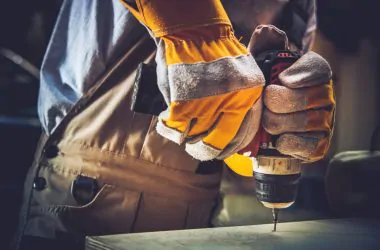Mechanical gloves, also known as work gloves or mechanic gloves, are indispensable tools that provide hand protection, grip, and dexterity in various industries and applications. From automotive repair and construction to manufacturing, healthcare, and outdoor activities, mechanical gloves play a crucial role in ensuring workers’ and enthusiasts’ safety, comfort, and efficiency. In this comprehensive guide, we will delve into the diverse applications of mechanical gloves, highlighting their importance and suitability for various tasks and environments.
Automotive Repair and Maintenance
One of the primary applications of mechanical gloves is in automotive repair and maintenance. Mechanics and automotive technicians rely on these gloves for protection against cuts, abrasions, oils, and chemicals encountered during engine repairs, part replacements, and maintenance tasks. The grip-enhancing features of mechanical gloves enable precise handling of tools, fasteners, and delicate components without compromising dexterity.
Construction and Carpentry
In the construction and carpentry industries, mechanical gloves are essential for workers handling power tools, sharp materials, and heavy equipment. These gloves protect against cuts, punctures, splinters, and impacts while providing a secure grip for operating saws, drills, hammers, and other tools. The durability and flexibility of mechanical gloves make them ideal for framing, roofing, drywall installation, and finishing carpentry tasks.
Manufacturing and Industrial Settings
Workers in manufacturing facilities, warehouses, and industrial settings rely on mechanical gloves to safely and efficiently handle materials, machinery, and equipment. Whether operating assembly lines, handling metal parts, or working with machinery, mechanical gloves offer protection against cuts, abrasions, impacts, and chemical exposures. The versatility of these gloves makes them suitable for various manufacturing processes, including metalworking, fabrication, machining, and assembly.
Plumbing and HVAC
Plumbers, HVAC technicians, and pipefitters use mechanical gloves to protect their hands during installations, repairs, and maintenance of plumbing and heating systems. These gloves offer resistance against sharp edges, hot pipes, and chemical cleaners commonly used in plumbing and HVAC work. The grip and dexterity provided by mechanical gloves enhance the handling of pipes, fittings, valves, and tools, improving efficiency and safety on the job.
Electrical Work and Electronics
Electricians, electronics technicians, and electrical engineers wear mechanical gloves for protection when working with wiring, circuits, and electrical components. These gloves offer insulation against electrical shocks and burns, reducing the risk of electrical injuries. The tactile sensitivity and grip of mechanical gloves allow precise handling of wires, connectors, switches, and test equipment, ensuring accurate installations and troubleshooting.
Outdoor Maintenance and Landscaping
In outdoor maintenance and landscaping tasks, mechanical gloves protect against thorns, sharp objects, and abrasive surfaces encountered in gardening, landscaping, and yard work. Landscapers, gardeners, and outdoor enthusiasts use these gloves for pruning, trimming, mowing, and handling landscaping materials. The durability and comfort of mechanical gloves make them suitable for prolonged use in outdoor environments.
Emergency Response and Public Safety
Firefighters, emergency medical responders, and law enforcement officers wear mechanical gloves for protection during emergency response, firefighting, and law enforcement activities. These gloves offer resistance against heat, flames, sharp objects, and hazardous materials encountered in rescue operations and firefighting. The grip and dexterity of mechanical gloves enable effective handling of tools, ropes, and equipment in demanding and high-risk situations.
Healthcare and Laboratory Settings
In healthcare and laboratory settings, medical technicians, laboratory personnel, and healthcare workers wear mechanical gloves for protection during specimen handling, medical procedures, and infection control. These gloves offer barrier protection against biological hazards, chemicals, and contaminants, reducing the risk of cross-contamination and exposure to infectious agents. The tactile sensitivity of mechanical gloves allows healthcare professionals to perform delicate tasks with precision and safety.
Marine and Shipbuilding
In marine industries and shipbuilding, mechanical gloves are essential for vessel construction, maintenance, and repair workers. These gloves protect against marine hazards, chemicals, and heavy equipment in shipyards and maritime environments. Shipbuilders, marine technicians, and dockworkers rely on mechanical gloves to safely handle ropes, rigging, welding equipment, and marine hardware.
Aerospace and Aviation
Aerospace technicians, aircraft mechanics, and aviation professionals wear mechanical gloves for aircraft inspections, repairs, and component handling tasks. These gloves protect sharp edges, hydraulic fluids, fuel, and electrical hazards present in aviation maintenance. The grip and dexterity offered by mechanical gloves enable precise work on aircraft systems, engines, avionics, and structural components.
Recreational and DIY Projects
Enthusiasts, hobbyists, and DIY enthusiasts use mechanical gloves for various recreational activities and DIY projects at home. Whether working on automotive hobbies, woodworking projects, home repairs, or outdoor adventures, these gloves offer protection, grip, and comfort. DIY enthusiasts benefit from the versatility and durability of mechanical gloves for tasks such as painting, gardening, home improvement, and crafting.
Conclusion
Mechanical gloves are versatile and essential tools used across diverse industries and tasks, including automotive repair, construction, manufacturing, healthcare, emergency response, outdoor maintenance, marine, aerospace, and recreational activities. Mechanical gloves enhance safety, efficiency, and performance in various work environments by providing hand protection, grip, dexterity, and comfort. Understanding the applications and benefits of mechanical gloves enables workers, professionals, and enthusiasts to choose the right gloves for their specific tasks and ensure a safer and more productive work experience.
This article is posted on Youss.
